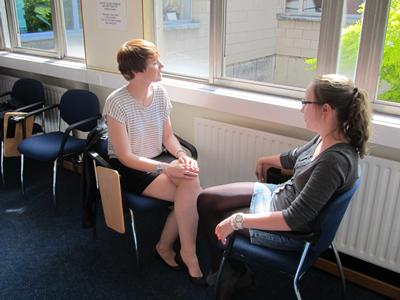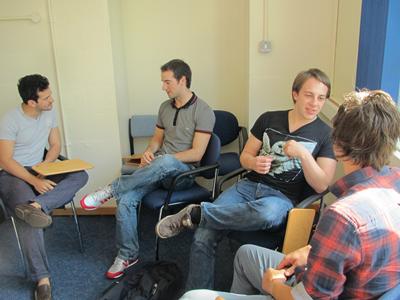

The Communication theme runs through all years of medical education incorporating lectures, experiential learning, and, increasingly, working with ‘simulated patients'.
Since the development of the Communication theme the rather ‘old fashioned' approach of ‘clinical' and ‘communication' skills being learnt independently of each other - despite the obvious fact that doctors are required to communicate with patients whilst carrying out clinical examinations - has now changed.
A significant part of Communication is the time learners now spend with simulated patients. This increase has come from changing health care policy, curricular initiatives and an increasing emphasis on the assessment of clinical competencies.
As part of the Communication theme, medical students are required to attend communication skills workshops, which were developed in order to bring these aspects of the medical curriculum together in a realistic yet ‘safe' environment, drawing on elements of problem-based learning.
A wide variety of scenarios, together with a corresponding set of learning outcomes, were developed. Scenarios were designed to reflect ‘real' situations that medical students may encounter at various stages of their training, rather than situations that they would be unlikely to face until later in their careers.
In designing these workshops, we were influenced by Kolb's (1993) experiential learning cycle. According to Kolb, learning occurs through a process of observation and experience, via reflection and experimenting with new ways of doing things.
The views of Kurtz et al (2005) have very much influenced the delivery of the workshops:
"...although understanding what it takes to communicate effectively is important, to actually improve communication it is essential to be able to use communication skills in practice."


The ‘experience' belongs to the learners, and the facilitator's role is to help them to get the most out of the experience - and to be open to the learners' evaluation of their endeavours to achieve this end.
Group sizes have been reduced to enable all participants to play an active role in each scenario; and the relevance of the scenarios to medical students has been made more explicit in order to make the learning more 'real'.
Providing a learning environment in which learners are comfortable both giving and receiving honest and constructive feedback is perhaps the biggest challenge in facilitating these sessions - and one which certainly cannot be taken for granted.
The facilitators strive to create effective and collaborative learning groups that are conducive to both personal and professional development, and in which learners feel able to 'take risks' and experiment with their behaviour.
Examples of role-play scenarios
Through experiential learning, students have the opportunity to practise, develop their skills and demonstrate their competence.
Purpose of Scenario: Communicating with sensitivity whilst carrying out a breast examination.
Learning Outcomes: Through experiential learning, the students will have the opportunity to practise, develop their skills and demonstrate their competence in being able to:
Participant: Medical student
Setting: Face-to-face, Well woman clinic
Scenario: Barbara Ross is a 60 year old lady who has come to the well woman clinic where you are on placement. The registrar took a full history from Mrs Ross, but was called away before having undertaken the examination. You have been fully briefed by the registrar, and you are now required to examine Mrs Ross.
History: Mrs Ross has been fit and well until two weeks ago when she started to become tired and experience some back pain.
PMH: 2 C sections, knee replacement after tennis injury 10 years ago.
Social: In local women's institute, plays bridge and golf regularly. Retired catering manager.
Family: Two daughters, both married and living in London. Divorced (7 years ago).
Medications: Nil
Purpose of Scenario: Supporting a patient facing the prospect of bad news.
Learning Outcomes: Through experiential learning, the students will have the opportunity to practise, develop their skills, and demonstrate their competence in being able to:
Participant: Medical student
Setting: Face-to-face, Medical Ward
Scenario: Kevin Field is a 30 year old man who has been admitted for investigations following the discovery of a hard lump in his right testicle. He is usually fit and well and has never been in hospital before.
A biopsy and examination has strongly indicated testicular cancer, although histology results are necessary for full confirmation.
The consultant urologist has spoken to Mr Field, but had limited time.
Task: You have been asked to speak to Mr Field about any concerns that he may have.
The University cannot accept responsibility for external websites.